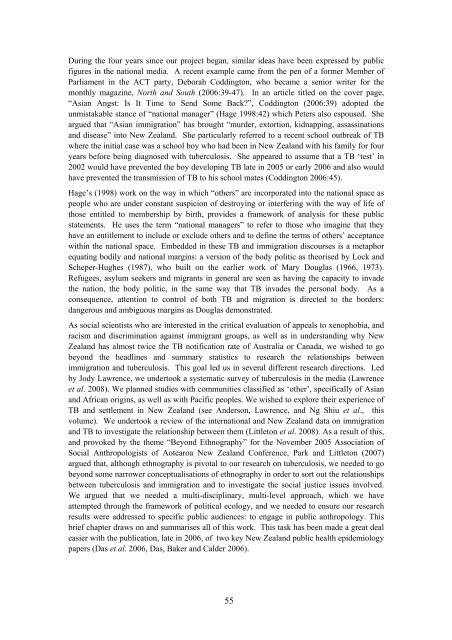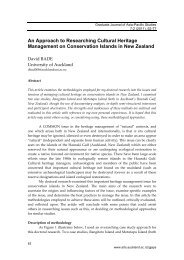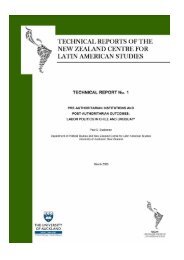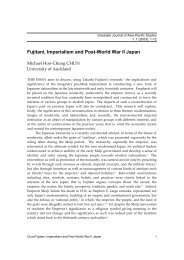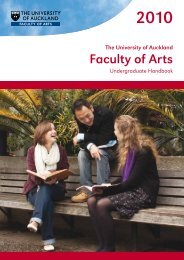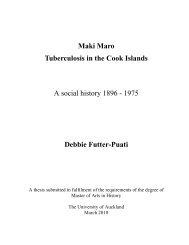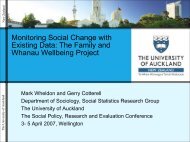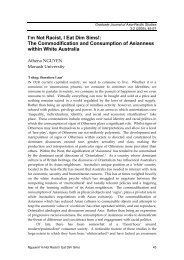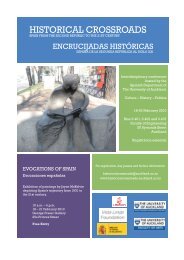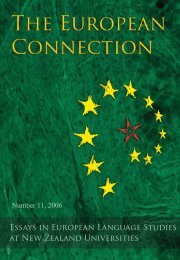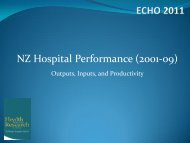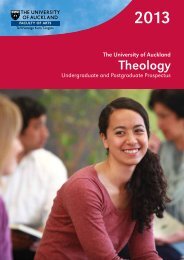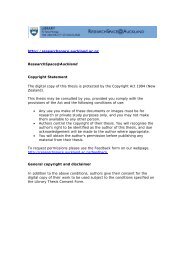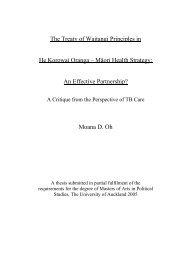During the four years since our project began, similar ideas have been expressed by publicfigures in the national media. A recent example came from the pen <strong>of</strong> a former Member <strong>of</strong>Parliament in the ACT party, Deborah Coddington, who became a senior writer for themonthly magazine, North <strong>and</strong> South (2006:39-47). In an article titled on the cover page,“Asian Angst: Is It Time to Send Some Back?”, Coddington (2006:39) adopted theunmistakable stance <strong>of</strong> “national manager” (Hage 1998:42) which Peters also espoused. Sheargued that “Asian immigration” has brought “murder, extortion, kidnapping, assassinations<strong>and</strong> disease” into New Zeal<strong>and</strong>. She particularly referred to a recent school outbreak <strong>of</strong> TBwhere the initial case was a school boy who had been in New Zeal<strong>and</strong> with his family for fouryears before being diagnosed with tuberculosis. She appeared to assume that a TB ‘test’ in2002 would have prevented the boy developing TB late in 2005 or early 2006 <strong>and</strong> also wouldhave prevented the transmission <strong>of</strong> TB to his school mates (Coddington 2006:45).Hage’s (1998) work on the way in which “others” are incorporated into the national space aspeople who are under constant suspicion <strong>of</strong> destroying or interfering with the way <strong>of</strong> life <strong>of</strong>those entitled to membership by birth, provides a framework <strong>of</strong> analysis for these publicstatements. He uses the term “national managers” to refer to those who imagine that theyhave an entitlement to include or exclude others <strong>and</strong> to define the terms <strong>of</strong> others’ acceptancewithin the national space. Embedded in these TB <strong>and</strong> immigration discourses is a metaphorequating bodily <strong>and</strong> national margins: a version <strong>of</strong> the body politic as theorised by Lock <strong>and</strong>Scheper-Hughes (1987), who built on the earlier work <strong>of</strong> Mary Douglas (1966, 1973).Refugees, asylum seekers <strong>and</strong> migrants in general are seen as having the capacity to invadethe nation, the body politic, in the same way that TB invades the personal body. As aconsequence, attention to control <strong>of</strong> both TB <strong>and</strong> migration is directed to the borders:dangerous <strong>and</strong> ambiguous margins as Douglas demonstrated.As social scientists who are interested in the critical evaluation <strong>of</strong> appeals to xenophobia, <strong>and</strong>racism <strong>and</strong> discrimination against immigrant groups, as well as in underst<strong>and</strong>ing why NewZeal<strong>and</strong> has almost twice the TB notification rate <strong>of</strong> Australia or Canada, we wished to gobeyond the headlines <strong>and</strong> summary statistics to research the relationships betweenimmigration <strong>and</strong> tuberculosis. This goal led us in several different research directions. Ledby Jody Lawrence, we undertook a systematic survey <strong>of</strong> tuberculosis in the media (Lawrenceet al. 2008). We planned studies with communities classified as ‘other’, specifically <strong>of</strong> Asian<strong>and</strong> African origins, as well as with Pacific peoples. We wished to explore their experience <strong>of</strong>TB <strong>and</strong> settlement in New Zeal<strong>and</strong> (see Anderson, Lawrence, <strong>and</strong> Ng Shiu et al., thisvolume). We undertook a review <strong>of</strong> the international <strong>and</strong> New Zeal<strong>and</strong> data on immigration<strong>and</strong> TB to investigate the relationship between them (Littleton et al. 2008). As a result <strong>of</strong> this,<strong>and</strong> provoked by the theme “Beyond Ethnography” for the November 2005 Association <strong>of</strong>Social Anthropologists <strong>of</strong> Aotearoa New Zeal<strong>and</strong> Conference, Park <strong>and</strong> Littleton (2007)argued that, although ethnography is pivotal to our research on tuberculosis, we needed to gobeyond some narrower conceptualisations <strong>of</strong> ethnography in order to sort out the relationshipsbetween tuberculosis <strong>and</strong> immigration <strong>and</strong> to investigate the social justice issues involved.We argued that we needed a multi-disciplinary, multi-level approach, which we haveattempted through the framework <strong>of</strong> political ecology, <strong>and</strong> we needed to ensure our researchresults were addressed to specific public audiences: to engage in public anthropology. Thisbrief chapter draws on <strong>and</strong> summarises all <strong>of</strong> this work. This task has been made a great dealeasier with the publication, late in 2006, <strong>of</strong> two key New Zeal<strong>and</strong> public health epidemiologypapers (Das et al. 2006, Das, Baker <strong>and</strong> Calder 2006).55
Multi-level <strong>and</strong> multi-disciplinary<strong>The</strong> theoretical orientation <strong>of</strong> the New Zeal<strong>and</strong>-based Political ecology <strong>of</strong> TB project (seeLittleton <strong>and</strong> King, Chapter 3) encouraged an approach which was founded in the disciplines <strong>of</strong>the principal investigators: social-cultural <strong>and</strong> biological anthropology, history <strong>and</strong> geography.In addition we found that we needed to draw on epidemiology, public health, medical researchin TB, infectious diseases, <strong>and</strong> immunology, <strong>and</strong> DNA studies, to know where to focus ourresearch <strong>and</strong> writing <strong>and</strong> how to make optimum use <strong>of</strong> our ethnographic <strong>and</strong> historical data. Wecertainly needed to consider the minutiae <strong>of</strong> everyday life, including material conditions <strong>and</strong>livelihoods, social relationships <strong>and</strong> social-spatial networks, peoples’ aspirations, values,underst<strong>and</strong>ings <strong>and</strong> experience, <strong>and</strong> their exercise <strong>of</strong> agency. Interactions between this personallevel <strong>and</strong> health systems <strong>and</strong> policy, the views <strong>and</strong> values <strong>of</strong> those who work within them, <strong>and</strong> arange <strong>of</strong> other structural features at the regional <strong>and</strong> national levels linked the personal to thestructural dimensions. Settlement patterns <strong>of</strong> recent migrants, greatly affected by the availability<strong>of</strong> affordable <strong>and</strong>, in some cases, appropriate, housing, had a direct relationship to the clustering<strong>of</strong> TB cases. Popular culture, especially media representation <strong>of</strong> TB <strong>and</strong> <strong>of</strong> the groups thoughtto be the most affected by it, was implicated in both the personal <strong>and</strong> structural dimensions.Historical political processes, including transnational <strong>and</strong> globalising forces, related not just todisease epidemiology <strong>and</strong> transmission but also to colonisation, immigration, conflict <strong>and</strong>international markets. Movements <strong>of</strong> people, whether <strong>of</strong> international students, migrants,workers or refugees, or New Zeal<strong>and</strong>ers who travel, linked the local aspects <strong>of</strong> personal, social<strong>and</strong> cultural life to international influences.Although Mr Peters has been silent on “the diseased immigrant” since his promotion toForeign Minister, there are many contenders for his role as xenophobia-inciter, Coddington(2006) being among the most recent. Our research project as a whole provides information<strong>and</strong> perspectives which can be used to evaluate the statements from such figures. This paper isspecifically devoted to unravelling some <strong>of</strong> the issues concerning the incidence rates <strong>of</strong> TBdisease, especially as these relate to migrants, <strong>and</strong> seeking to underst<strong>and</strong> the social <strong>and</strong>political implications <strong>of</strong> these disease patterns <strong>and</strong> the ways in which these patterns areinterpreted. To do this we have had to draw on non-ethnographic research, which led useventually to a new series <strong>of</strong> ethnographic questions. Several <strong>of</strong> the chapters in this volumeare responses to these questions.StatisticsIn a nutshell, we found that the problem with the ‘Winston theory’, i.e., that new immigrantsbring disease, including TB, over the border, is that it does not accord with either internationalor New Zeal<strong>and</strong> epidemiological data for tuberculosis. While here <strong>and</strong> elsewhereapproximately 20 percent <strong>of</strong> new arrivals who eventually are diagnosed with TB (Turnbull2002) are diagnosed in their first year in New Zeal<strong>and</strong> <strong>and</strong> might justifiably be thought tohave active tuberculosis disease when they crossed the border, many develop TB more than ayear after arrival. This suggests that more than 80 percent do not have active TB disease whenthey first arrive (Das et al. 2006). This pattern is typical <strong>of</strong> other low-incidence countries(Littleton et al. 2008:Table 3). It strongly suggests that certain aspects <strong>of</strong> the migration <strong>and</strong>settlement process <strong>and</strong> environments in the host country are implicated in the high non-NewZeal<strong>and</strong>-born notification rate in the years after first arrival.Our first step in seeking to underst<strong>and</strong> this apparent puzzle was to acquire further medicalinformation about tuberculosis, its detection, treatment <strong>and</strong> prevention <strong>and</strong> the circumstances56
- Page 1 and 2:
RESEARCH IN ANTHROPOLOGY & LINGUIST
- Page 3 and 4:
The University of Auckland acknowle
- Page 5 and 6:
Part 3 Living with TuberculosisIntr
- Page 7: The workshopOur productive and stim
- Page 10 and 11: Part 1 Unpacking TuberculosisIntrod
- Page 12 and 13: ReferencesAscione, F., 2005. Childr
- Page 14 and 15: Cases of active TB disease were def
- Page 16 and 17: 40.035.0Age-specific incidence rate
- Page 18 and 19: 2001-06 the incidence rate for thos
- Page 20 and 21: incidence rates for foreign-born pe
- Page 22 and 23: that cases for whom the diagnosis o
- Page 24 and 25: Voss, L., M. Campbell, C. Tildesley
- Page 26 and 27: Figure 1Views of the 5th metacarpal
- Page 28 and 29: when, in reality, recently transmit
- Page 30 and 31: over” host (Morris et al 1994:172
- Page 32 and 33: de Lisle, Geoffery W., C. G. Mackin
- Page 34 and 35: Chapter 3The Political Ecology of T
- Page 36 and 37: social networks (particularly for o
- Page 38 and 39: community. However, as Anderson’s
- Page 40 and 41: 2004. Over this period the rate of
- Page 42 and 43: the people interviewed had access t
- Page 44 and 45: of household crowding or income ine
- Page 46 and 47: Chapter 4Tuberculosis and Syndemics
- Page 48 and 49: patterns. The authors examined “a
- Page 50 and 51: Partners of Manitoba that explored
- Page 52 and 53: The Point Douglas CA is 10.9 square
- Page 54 and 55: Table 2Selected social determinants
- Page 56 and 57: Rhodes, Tim, Merrill Singer, Philip
- Page 60 and 61: under which a person who has had la
- Page 62 and 63: groups in New Zealand that promotes
- Page 64 and 65: Littleton, J., J. Park, C. Thornley
- Page 66 and 67: Nair 1997, Geetakrishnan 1988, Puro
- Page 68 and 69: with peer review, group work and re
- Page 70 and 71: of TB cases. TANI became aware of t
- Page 72 and 73: The programme has been successful i
- Page 74 and 75: Chapter 7The Treaty of Waitangi Pri
- Page 76 and 77: Given the apparent limitations of H
- Page 78 and 79: delayed TB diagnosis and inappropri
- Page 80 and 81: Six participants believed they had
- Page 82 and 83: strategies, acknowledging different
- Page 84 and 85: Hayward, Janine, 1997. Appendix: Th
- Page 86 and 87: Chapter 8Matching Research with Evi
- Page 88 and 89: problem in Aboriginal communities w
- Page 90 and 91: officials advised community members
- Page 92 and 93: ResultsThe MEDLINE search generated
- Page 94 and 95: Gibson et al. 2005 X XCook et al. 2
- Page 96 and 97: in rates will likely be achieved on
- Page 98 and 99: Daschuk, J.W., Hackett, P., MacNeil
- Page 100 and 101: Ontario Lung Association, 2003. Tub
- Page 102 and 103: Part 2 Reproducing TuberculosisIntr
- Page 104 and 105: particular focus on the quality of
- Page 106 and 107: Chapter 9The Contribution of Tuberc
- Page 108 and 109:
years of civilian mortality registr
- Page 110 and 111:
Soldiers’ mortality rates from al
- Page 112 and 113:
While fluctuations in mortality can
- Page 114 and 115:
continue, perhaps to a very small p
- Page 116 and 117:
Chapter 10Tuberculosis Mortality am
- Page 118 and 119:
schools. This forced school officia
- Page 120 and 121:
Figure 2 Residential Schools and Re
- Page 122 and 123:
Figure 3 Manitoba TB treatment faci
- Page 124 and 125:
attend classes on forty of the seve
- Page 126 and 127:
Again, this was hardly a shocking d
- Page 128 and 129:
Figure 51949 TB Survey.Indian Affai
- Page 130 and 131:
In December of 1943 the Canadian Tu
- Page 132 and 133:
communities and sent south to dista
- Page 134 and 135:
3 LAC RG 10, Volume 3855, File 7996
- Page 136 and 137:
60 Tuberculosis Control in Manitoba
- Page 138 and 139:
This article examines patterns of d
- Page 140 and 141:
dying of consumption, that great en
- Page 142 and 143:
Study of mortality seasonality reve
- Page 144 and 145:
Recognizing the cumulative biologic
- Page 146 and 147:
Crowded living quarters provided an
- Page 148 and 149:
ReferencesAmerican Lung Association
- Page 150 and 151:
Stephens, Christianne V., 2004. A p
- Page 152 and 153:
Chapter 12Norway House Residential
- Page 154 and 155:
thought that Brandon was too far aw
- Page 156 and 157:
Tuberculosis in Norway House Reside
- Page 158 and 159:
The greatest number of deaths, almo
- Page 160 and 161:
esponsible for conducting the medic
- Page 162 and 163:
informed Bunn that he had treated s
- Page 164 and 165:
Hardiman EF. 1902. Principal’s Re
- Page 166 and 167:
Chapter 13A Political Ecological Pe
- Page 168 and 169:
Figure 2Whakarewarewa in the 1920s.
- Page 170 and 171:
Comparison of the housing condition
- Page 172 and 173:
1920s, was the government finally c
- Page 174 and 175:
dilapidated. They were observed als
- Page 176 and 177:
ReferencesAllen, A.E. and D.G. Phil
- Page 178 and 179:
Wang, P.D. and R.S. Lin, 2000. Tube
- Page 180 and 181:
ejection from within their family o
- Page 182 and 183:
Chapter 14The Bright Light of Actio
- Page 184 and 185:
environment” 18 of Taranaki Maori
- Page 186 and 187:
In the face of ongoing complaints a
- Page 188 and 189:
Fitzgerald, Criena, 2002. Making tu
- Page 190 and 191:
Chapter 15Pakeha and Tuberculosis i
- Page 192 and 193:
understand vulnerability and suppor
- Page 194 and 195:
around when she first had TB knew t
- Page 196 and 197:
An article from the Dominion newspa
- Page 198 and 199:
Scheper-Hughes, N., 1992. Death Wit
- Page 200 and 201:
Tuberculosis: A disease of othersTh
- Page 202 and 203:
Tuberculosis and infectionTuberculo
- Page 204 and 205:
secondly, the tuberculosis sufferer
- Page 206 and 207:
Bhadrak, an Indian man in his 20s,
- Page 208 and 209:
Chapter 17Health, Wellbeing and Dia
- Page 210 and 211:
Somalia (Lillebaek et al. 2002:682)
- Page 212 and 213:
carried out. I also interacted with
- Page 214 and 215:
The Auckland Somali population is h
- Page 216 and 217:
mask usually had to be worn by pati
- Page 218 and 219:
understanding of their migration hi
- Page 220 and 221:
Warfa, N., K. Bhui, T. Craig, S. Cu
- Page 222 and 223:
Figure 1New Zealand and its Pacific
- Page 224 and 225:
oth English and Samoan. The second
- Page 226 and 227:
Health cultures and explanations of
- Page 228 and 229:
Duality of TBMany of the older Paci
- Page 230 and 231:
e considered in the ecology of TB,
- Page 232 and 233:
Interviewer: “Do you have any ide
- Page 234 and 235:
McArthur, N., 1965. Island Populati
- Page 236 and 237:
ContributorsAnneka Anderson, Depart
- Page 238 and 239:
Moana Oh (Ngati Rarua, Ngati Toraru
- Page 240:
RAL-e1 Geoarchaeological Investigat


